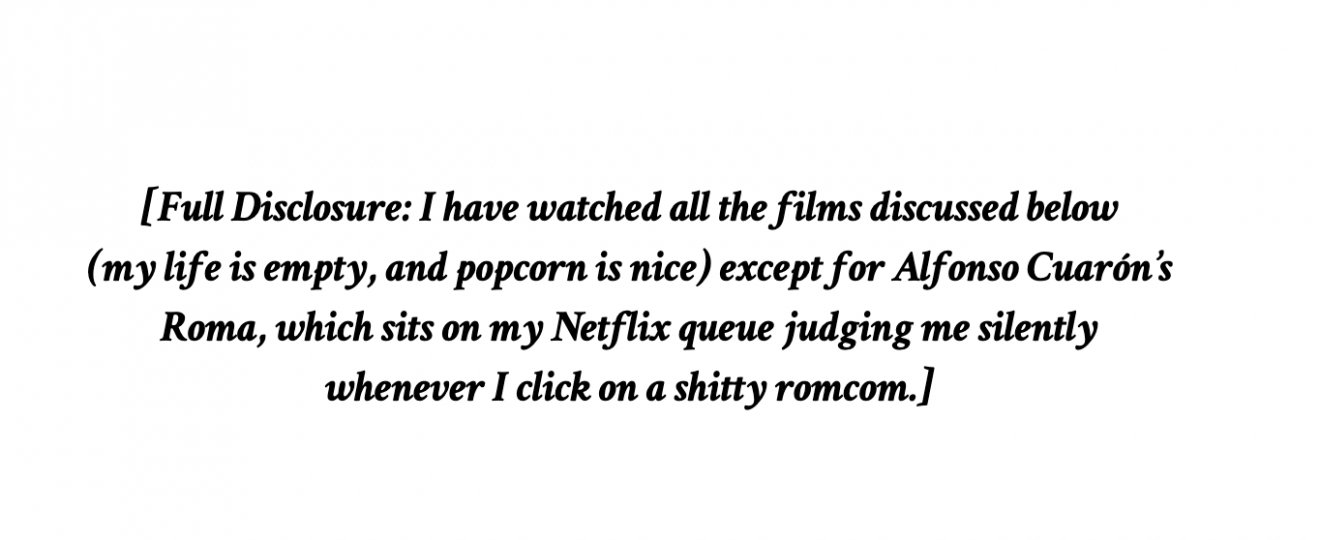A belated Oscars Rant
Hollywood has a very distinct flavour of liberalism. Despite Fox News’ insistence to the contrary, the industry’s ideology is far from Bolivarian Anarcho-communism, and closer to a bland feel-good centrism that pays lip service to social equality without ever challenging the status quo. Just like Nike is eager to promote Colin Kaepernick and Serena Williams to monetize its progressive bona fides (without actually attempting to deal with the racism and sexism within its corporate structure), Hollywood has always been inclined to reward filmmaking that called for a more equal society, as long as it wasn’t too loud or too radical.
To its credit, the LA enclave has recently attempted to reckon with, and address, its political hypocrisy. From the expanding of the Academy’s membership in the aftermath of #OscarsSoWhite to the reassuring 2016 Moonlight win after the snub of Carol and Brokeback Mountain, public pressure has led to drastic change over a short period of time. The Academy also seemed to be advancing artistically, rewarding innovative storytelling and visuals (as seen in Birdman or The Shape of Water) over classic historical plots, white-boy-meets-white-girl stories (Lalaland) and expensive, male-only war productions.
But it is all too easy to fall back into bad habits. This year, the Academy voted to give its top award to Green Book, a film that postulates that extreme racism (the kind that leads you to through away drinking glasses because black people drank from them) can be solved over a road trip. The award is the perfect embodiment of the philosophy described above: in the best year for black cinema since 2016 (Moonlight, Fences, Hidden Figures) the Academy denounces racism through a film where the main character is a white man. At least Driving Miss Daisy (a clear inspiration for the producers) made Morgan Freeman Jessica Tandy’s co-lead, instead of relegating the only African American character to the supporting actor rank. Indeed, at a time when race is being portrayed from more radical perspectives (Black KKKlansman) and more movingly (If Beale Street Could Talk) it was baffling to see the award going to a bland rehash where racism is exclusive to the 1960’s segregated south and light-heartedly bigoted Italian Americans. Perhaps this depiction of race ought not be so surprising, given the film’s creative process, produced by the white chauffer’s openly Islamophobic son without consulting with Don Shirley’s family at all (they have since denounced the production).
Ideological fault lines asides, the Oscars showed a worrying tendency to reward second-rate cinema. Green Book was reluctant to address race properly, but it was also, to put it plainly, extremely mediocre. Its characters remained undefined beyond the ‘kinda-racist Italian guy who the filmmakers insist is decent’ and ‘poor oppressed black man who is discriminated against’ archetypes. Its cinematography was not terrible, but it wasn’t particularly good either, as was its Oscar-winning screenplay, which at one point introduces a whole wait-he-is-actually-gay plotline that then goes unacknowledged for the remainder of the film. The whole thing ends in a painfully predictable and simultaneously unfeasible Christmas dinner where everyone loves everyone and American racism is officially pronounced dead.
Not that there weren’t worse possible outcomes. After all, Bohemian Rhapsody, an uncoherent queerphobic ahistorical rambling, plagued with plugins where the collaborating bandmembers forcefully highlight the key role they had in certain iconic songs (insecure much?) was nominated for best picture too. It ended up taking home the most Oscars, four in total, including best editing (apparently Academy voters now value choppiness and unnecessary camera cuts) and best actor in a leading role for Rami Malek (one of three straight actors who won for interpreting a queer role, with the extra aggravation of how poorly Mercury’s sexuality was handled by Rhapsody).
Meanwhile, several remarkable films where snubbed. The favourite, a dark-humored historical comedy-drama proved that the Academy was not ready for a female-centric tale of power and lesbianism in 18th Century England. Its innovative cinematography, with broad lens shots and panning between scenes, and its witty dialogue, which built complex and fascinating female characters, failed to win in their categories. Its only win in the best actress category was satisfying but bitter for the presence of many deserving nominees, from Lady Gaga’s stunning debut in the otherwise average A Star is Born to Melissa McCarthy’s delightful Lee Israel. Indeed, Can you ever forgive me? was similarly overlooked, with Richard E. Grant’s performance offering a nuanced depiction of queerness and aging that arguably more deserving than Ali’s Shirley. Similarly, whilst Spiderman: Into the Spider-Verse was certainly deserving of the honour, I couldn’t help but sigh at Wes Anderson’s loss, given the unparalleled artistry of Isle of Dogs.
The biggest snub, however, came before the ceremony itself, when If Beale Street Could Talk failed to garner nominations across more categories. Barry Jenkin’s newest film may be less emotionally intense than Moonlight, but it features stunning cinematography with a carefully selected palette and the most beautifully shot sex scenes I have ever seen on the silver screen, as well as excellent performances by all its cast.
With poor political and cinematographic choices, the 2019 Oscars were a stark reminder of what the old Academy was like.




